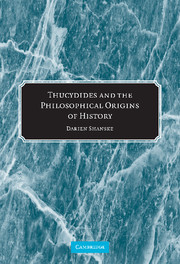Book contents
- Frontmatter
- Contents
- Acknowledgments
- Introduction
- 1 Thucydides's Vision
- 2 The Case of Pericles
- 3 Deinon, Logos, and the Tragic Question Concerning the Human
- 4 Thucydidean Temporality
- Appendix I Restoring Key Terms 1.1–1.23
- Appendix II Pretragic History of Deinon
- Appendix III Wittgenstein on Fly-Bottles, Aspect Seeing, and History
- Appendix IV Heidegger on World and Originary Temporality
- Notes
- Bibliography
- Index
Appendix IV - Heidegger on World and Originary Temporality
Published online by Cambridge University Press: 19 August 2009
- Frontmatter
- Contents
- Acknowledgments
- Introduction
- 1 Thucydides's Vision
- 2 The Case of Pericles
- 3 Deinon, Logos, and the Tragic Question Concerning the Human
- 4 Thucydidean Temporality
- Appendix I Restoring Key Terms 1.1–1.23
- Appendix II Pretragic History of Deinon
- Appendix III Wittgenstein on Fly-Bottles, Aspect Seeing, and History
- Appendix IV Heidegger on World and Originary Temporality
- Notes
- Bibliography
- Index
Summary
Introduction
In many ways, Heidegger cannot be more different from Wittgenstein. Heidegger published a voluminous number of works in his lifetime. Unlike Wittgenstein's, Heidegger's philosophical writings almost always explicitly engage the philosophical tradition, and Heidegger clearly believes that there are proper philosophical problems about which it is the task of philosophers to think. Furthermore, especially in the work under consideration here, Being and Time, Heidegger's work is extremely systematic.
Despite the differences, it has become increasingly common to see connections between the two thinkers. The Philosophical Investigations and Being and Time are the twentieth century's two great attacks on Cartesianism. In both cases, that of Heidegger as well as that of Wittgenstein, much emphasis is placed on the fact that the Cartesian picture of isolated subjects is phenomenologically false, and thus the key is to remind us of what we already know. In the case of Wittgenstein, as we saw, the method used was that of short aphoristic sayings meant to reveal the blind spots our philosophical ideas and jargon have obscured. For Heidegger in Being and Time, the task is more ambitious. Heidegger's goal is to redescribe our everyday experience in a manner that is not Cartesian.
From Heidegger's more historical perspective, we are not bound to fall into Cartesianism, as Wittgenstein's more modest therapeutic approach would seem to imply. Not only is Cartesianism not phenomenologically true or philosophically coherent, it is a relatively special perspective on the world, even within Western intellectual history.
- Type
- Chapter
- Information
- Thucydides and the Philosophical Origins of History , pp. 185 - 198Publisher: Cambridge University PressPrint publication year: 2006

